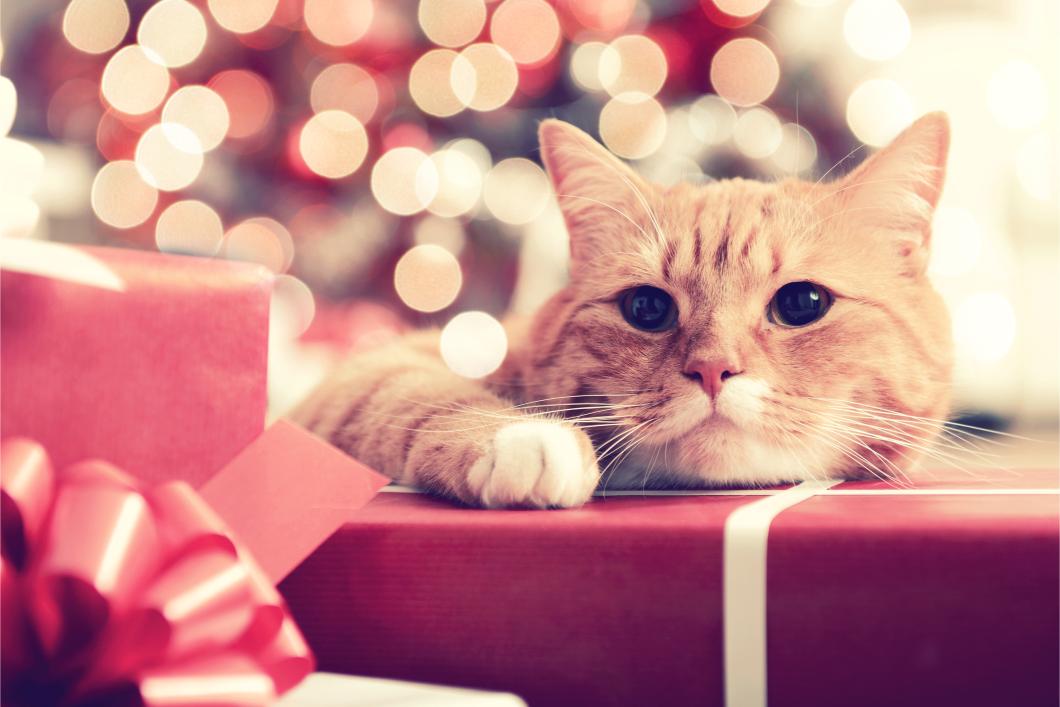Festive & Furry: Making the Holidays Safe

While some pets prefer a quiet corner far from the lights, camera, and action of the holiday season, the ones we know and love simply can’t get enough of all the splendor. Now, this doesn’t necessarily mean they’ll get into trouble between Thanksgiving and New Years. But the combination of their curiosity with the influx of dangerous items and events definitely ratchets up the risk. With our tips, your pet can get through the holidays with flying colors.
A Different World
Pets are creatures of habit. You could probably time some of their behavioral patterns down to the minute, including when they want to eat, go outside, play, and snooze. It is this delicate balance that creates a sense of confidence, trust, and calm in their demeanor.
The holidays can really shake up a routine. We tend to be away from home for longer periods, forgetting things, and placing events on the back burner. Sure, a pet can forgive a shorter walk or a late dinner. But if these things happen in tandem with a constantly ringing doorbell, unexpected guests, and confusing decorations, they could become highly stressed or anxious.
December Pet Care
Some pet owners opt for a night or two of boarding to reduce a pet’s exposure to a crowded, festive party. Likewise, scheduling a few play dates or daycare times can decrease unease.
Even if a pet is relaxed enough to be a part of a family dinner or gathering, they’ll still benefit from a quiet room to retreat to. Set up a nice, cozy bed for them away from the noise. Have fresh water on hand, delicious treats, and some of their favorite toys.
Holiday Hazards
The tastiest holiday foods can lead to a serious pet emergency. Limit your pet’s exposure to the following by restricting potential access to the kitchen, dining room, and garbage bins. Request that guests never feed your pet and pick up fallen food and discarded plates immediately.
- Chocolate
- Xylitol
- Alcohol
- Caffeine
- Poultry skin
- Bones
- Uncooked yeast dough
- Garlic, onions, chives
- Grapes or raisins
- Nuts
- Rich, fatty foods like butter or gravy
Decor and More
Pet experts recommend the following strategies to reduce a veterinary emergency:
- Brace the Christmas tree to the ceiling or wall to prevent it from falling over in the case of a jumping or climbing pet.
- Do not decorate the tree with tantalizing ornaments, such as realistic looking birds or other animals of prey.
- Breakable ornaments must be secured to the tree or not used at all.
- Tinsel, garlands, and ribbons can lead to serious GI obstruction or choking.
- Cover the tree stand so your pet cannot drink contaminated water.
- Sweep up any fallen needles on a daily basis.
- String lights and extension cords can cause electric shock or entanglement.
- Minimize candles or simmering potpourri.
Other greenery, including amaryllis, lilies, poinsettias, mistletoe, and holly should only be displayed on high surfaces that a pet can’t reach or not at all.
Holiday Pet Safety
Your friends at MarketPlace Veterinary Hospital know that the closeness we feel with our pets can be enhanced during the holiday season, but only when pet safety is the priority. Watch their behavior closely, pivot when necessary to keep them safe and relaxed, and focus on making only positive memories together.
Happy holidays from our veterinarians and staff members!

